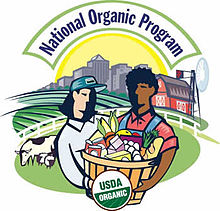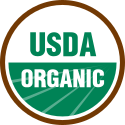From Wikipedia, the free encyclopedia
Jump to: navigation, search

 The National Organic Program administers the Organic Seal to products that meet the requirements.
The National Organic Program administers the Organic Seal to products that meet the requirements.
 Official seal of the National Organic Program
Official seal of the National Organic Program
In the United States, the National Organic Program (NOP) is the federal regulatory framework governing organic food. It is also the name of the organization in the Department of Agriculture (USDA) responsible for administering and enforcing the regulatory framework. The Organic Food Production Act of 1990 (7 U.S.C.A. § 6501-22) required that the USDA develop national standards for organic products. The NOP Final Rule was published in the Federal Register in 2000[1].
NOP regulations cover in detail all aspects of food production, processing, delivery and retail sale. Under the NOP, farmers and food processors who wish to use the word "organic" in reference to their businesses and products, must be certified organic. Producers with annual sales not exceeding $5,000 US are exempted[2] and do not require certification (however, they must still follow NOP standards, including keeping records and submitting to a production audit if requested, and cannot use the term certified organic). A USDA Organic seal identifies products with at least 95% organic ingredients[3].
There are currently 56 U.S. domestic certification agencies accredited by the USDA, including Organic Crop Improvement Association, CCOF, Oregon Tilth, Quality Assurance International (QAI), and Indiana Certified Organic. There are also 41 accredited foreign agencies that offer organic certification services.[4]
The NOP covers fresh and processed agricultural food products, including crops and livestock. It does cover non-food products that may be sold as organic, including natural fibers (eg: organic cotton). Health and [col
or="#0066cc"]beauty[/col
or] products (eg: organic shampoo) can also be labeled organic if compliant with NOP. The USDA NOP does have the authority to enforce organic standards in the realm of health and beauty products, and were encouraged to do so in a 2009 recommendation from the USDA National Organic Standards Board. While the actual law does apply to these products, enforcement remains limited in this market. [5]
The National Organic Program grew from fewer than twelve total employees in 2008 to approximately thirty in 2010. As of April 2011, it operates in three divisions: Standards, Accreditation and International Activities (AIA), and Compliance and Enforcement. [6]
In August 2008 the NOP announced that 15 of 30 federally accredited organic certifiers had been placed on probation for various violations of USDA organic standards.
Jump to: navigation, search

 The National Organic Program administers the Organic Seal to products that meet the requirements.
The National Organic Program administers the Organic Seal to products that meet the requirements.
 Official seal of the National Organic Program
Official seal of the National Organic ProgramIn the United States, the National Organic Program (NOP) is the federal regulatory framework governing organic food. It is also the name of the organization in the Department of Agriculture (USDA) responsible for administering and enforcing the regulatory framework. The Organic Food Production Act of 1990 (7 U.S.C.A. § 6501-22) required that the USDA develop national standards for organic products. The NOP Final Rule was published in the Federal Register in 2000[1].
NOP regulations cover in detail all aspects of food production, processing, delivery and retail sale. Under the NOP, farmers and food processors who wish to use the word "organic" in reference to their businesses and products, must be certified organic. Producers with annual sales not exceeding $5,000 US are exempted[2] and do not require certification (however, they must still follow NOP standards, including keeping records and submitting to a production audit if requested, and cannot use the term certified organic). A USDA Organic seal identifies products with at least 95% organic ingredients[3].
There are currently 56 U.S. domestic certification agencies accredited by the USDA, including Organic Crop Improvement Association, CCOF, Oregon Tilth, Quality Assurance International (QAI), and Indiana Certified Organic. There are also 41 accredited foreign agencies that offer organic certification services.[4]
The NOP covers fresh and processed agricultural food products, including crops and livestock. It does cover non-food products that may be sold as organic, including natural fibers (eg: organic cotton). Health and [col
or="#0066cc"]beauty[/col
or] products (eg: organic shampoo) can also be labeled organic if compliant with NOP. The USDA NOP does have the authority to enforce organic standards in the realm of health and beauty products, and were encouraged to do so in a 2009 recommendation from the USDA National Organic Standards Board. While the actual law does apply to these products, enforcement remains limited in this market. [5]
The National Organic Program grew from fewer than twelve total employees in 2008 to approximately thirty in 2010. As of April 2011, it operates in three divisions: Standards, Accreditation and International Activities (AIA), and Compliance and Enforcement. [6]
In August 2008 the NOP announced that 15 of 30 federally accredited organic certifiers had been placed on probation for various violations of USDA organic standards.





